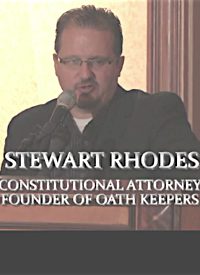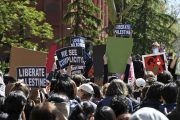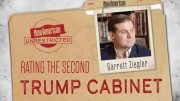
In response to the passage by the House and the Senate of the National Defense Appropriations Act of 2012 (NDAA), Stewart Rhodes (left), founder of Oath Keepers, announced a national effort to recall every member who voted for the act.
Oath Keepers was founded by Rhodes to encourage current members of the military services and veterans to keep their oath to protect and defend the Constitution against “all enemies, foreign and domestic.” Members commit to following certain “orders we will not obey,” including, as especially relevant to NDAA, Number Three:
We will NOT obey any order to detain American citizens as “unlawful enemy combatants” or to subject them to trial by military tribunal.
One of the causes of the American Revolution was the denial of the right to jury trial, the use of admiralty courts (military tribunals) instead, and the application of the laws of war to the colonists. After that experience, and being well aware of the infamous Star Chamber in English history, the Founders ensured that the international laws of war would apply only to foreign enemies, not to the American people. Thus, the Article III Treason Clause establishes the only constitutional form of trial for an American, not serving in the military, who is accused of making war on his own nation. Such a trial for treason must be before a civilian jury, not a tribunal.
The international laws of war do not trump our Bill of Rights. We reject as illegitimate any such claimed power, as did the Supreme Court in Ex Parte Milligan (1865). Any attempt to apply the laws of war to American civilians, under any pretext, such as against domestic “militia” groups the government brands “domestic terrorists,” is an act of war and an act of treason.
What appears to be reasonable on the surface is complicated by the actual “Oath of Enlistment” sworn by members of the military, to wit:
I, (NAME), do solemnly swear (or affirm) that I will support and defend the Constitution of the United States against all enemies, foreign and domestic; that I will bear true faith and allegiance to the same; and that I will obey the orders of the President of the United States and the orders of the officers appointed over me, according to regulations and the Uniform Code of Military Justice. So help me God.
Oath Keepers has taken the position that when the President gives an order not in compliance with the Constitution, their members should ignore the order and follow the Constitution. Accordingly, when Congress gives powers that it doesn’t possess or that violate the Constitution to the Executive branch, it must be brought to justice. As Rhodes noted in his announcement, “We consider the NDAA of 2012 to be a declaration of war on the American people, and an act of treason … Oath Keepers … across the nation will lead or assist efforts in their states to remove any member of Congress, regardless of party, who voted for this monstrosity.” He added:
These politicians from both parties betrayed our trust, and violated the oath they took to defend the Constitution. It’s not about the left or right, it’s about our Bill of Rights. Without the Bill of Rights, there is no America. It is the Crown Jewel of our Constitution, and the high-water mark of Western Civilization.
As two time Medal of Honor winner Marine General Smedley Butler once said, “There are only two things we should fight for. One is the defense of our homes and the other is the Bill of Rights.” [It is] time to fight.
Rhodes defends his strong stand by reminding those who will listen that claims by any administration to be able to arrest an American citizen without charge and hold that person in military detention without access to legal counsel and then try that person by a military tribunal are utterly without merit and basis in law. He says, “Such a practice is a direct violation not just of the right to Grand Jury indictment and jury trial under our Bill of Rights, but [it] also violates the Article III Treason Clause…”
He recommends reading Antonin Scalia’s dissent in the Supreme Court case Hamdi v. Rumsfeld where the majority held that “there is no bar to this Nation’s holding one of its own citizens as an enemy combatant.” Scalia’s dissent confronts the core of the constitutional protections against Executive claims that security overrides freedom:
The Founders well understood the difficult tradeoff between safety and freedom. “Safety from external danger,” Hamilton declared, “is the most powerful director of national conduct. Even the ardent love of liberty will, after a time, give way to its dictates. The violent destruction of life and property incident to war; the continual effort and alarm attendant on a state of continual danger, will compel nations the most attached to liberty, to resort for repose and security to institutions which have a tendency to destroy their civil and political rights. To be more safe, they, at length, become willing to run the risk of being less free.” The Federalist No. 8, p. 33.
The Founders warned us about the risk, and equipped us with a Constitution designed to deal with it.
Many think it not only inevitable but entirely proper that liberty give way to security in times of national crisis — that, at the extremes of military exigency, inter arma silent leges [in times of war, the law falls silent]. Whatever the general merits of the view that war silences law or modulates its voice, that view has no place in the interpretation and application of a Constitution designed precisely to confront war and, in a manner that accords with democratic principles, to accommodate it. Because the Court has proceeded to meet the current emergency in a manner the Constitution does not envision, I respectfully dissent.
When questioned about when would be the appropriate time that “we the people” should rise up against the pending dictatorship and imposition of martial law that the NDAA implies, Rhodes responded:
We veterans will exhaust all peaceful and lawful means left to us before we ever consider taking up arms. As Jefferson said in our Declaration of Independence:
Prudence, indeed, will dictate that Governments long established should not be changed for light and transient causes; and accordingly all experience hath shown, that mankind are more disposed to suffer, while evils are sufferable, than to right themselves by abolishing the forms to which they are accustomed.
In an interview at The Daily Bell in November, Rhodes noted that membership in Oath Keepers exceeds 10,000 dues-paying members, with hundreds more joining every month. But he said that what really matters is that for every member, “there are thousands of others who are of like mind, but who are part of the unknown and unknowable mass below the surface of the “Oath Keepers iceberg.”



